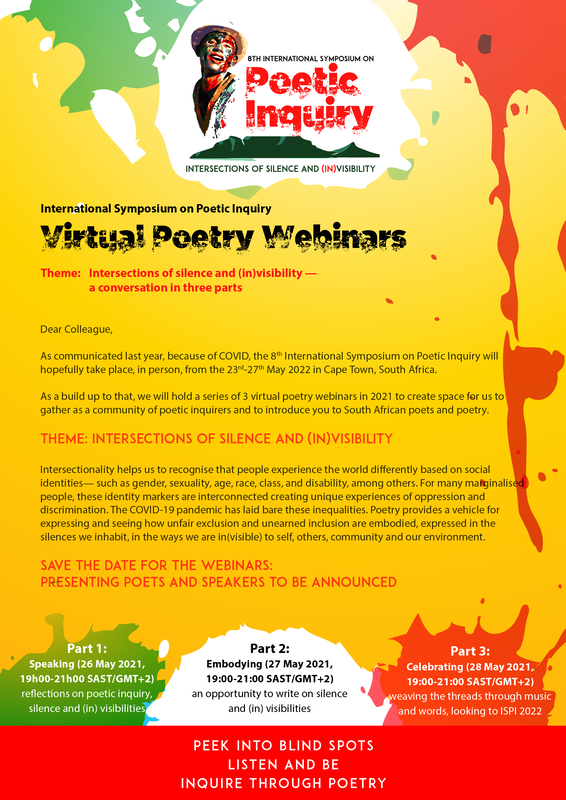Webinars held in May 2021
a conversation in three parts
|
Part 1: Speaking: Webinar 1:
Wednesday, 26th May at 7-9 pm SAST/GMT+2
Poetic Inquiry to render voice and visibility: Opening talk by Canadian Dr. Monica Prendergast who played a pivotal role in the establishment of poetic inquiry as a research method. Followed by a discussion moderated by Yvonne Sliep with Duduzile Ndlovu and Heidi van Rooyen (all South African researchers and poetic inquirers).
Poets traverse intersections of silence and (in)visibility: A poetry performance and discussion moderated by Raphael d’Abdon (writer, scholar, editor and translator) with three incredible young South African poets Maneo Mohale, Mjele Msimang and Pieter Odendall.
Part 2: Embodying: Webinar 2:
Thursday, 27th May at 7-9 pm SAST/GMT+2
Coordinated by Angela Hough (family constellations, narrative, art therapist and educator) these 3 workshops ran in parallel and were not recorded for sharing as they were participatory workshops.
Workshop 1: Body has voice
This workshop offers a process for writing and reflection on the theme using the body as a guide.
Workshop 2: Data has voice
Bring your own data (focus group or interview data, a journal article or chapter) that speaks to the theme. You will be guided to create found poems.
Workshop 3: You have voice
A facilitated small group space to share your poetry/poetic inquiry on the theme.
Thursday, 27th May at 7-9 pm SAST/GMT+2
Coordinated by Angela Hough (family constellations, narrative, art therapist and educator) these 3 workshops ran in parallel and were not recorded for sharing as they were participatory workshops.
Workshop 1: Body has voice
This workshop offers a process for writing and reflection on the theme using the body as a guide.
Workshop 2: Data has voice
Bring your own data (focus group or interview data, a journal article or chapter) that speaks to the theme. You will be guided to create found poems.
Workshop 3: You have voice
A facilitated small group space to share your poetry/poetic inquiry on the theme.
Part 3: Celebrating: Webinar 3:
Friday, 28th May at 7-9 pm SAST/GMT+2
Musical and Poetry Performance
Open Mic Session: Curated poetry performances from audience.
Closing Reflections by Malika Ndlovu (internationally recognised South African poet, performer and playwright).
Friday, 28th May at 7-9 pm SAST/GMT+2
Musical and Poetry Performance
Open Mic Session: Curated poetry performances from audience.
Closing Reflections by Malika Ndlovu (internationally recognised South African poet, performer and playwright).
